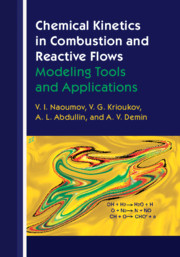Book contents
- Reviews
- Chemical Kinetics in Combustion and Reactive Flows
- Chemical Kinetics in Combustion and Reactive Flows
- Copyright page
- Dedication
- Contents
- Preface
- Acknowledgments
- Nomenclature
- Part I Basic Components of Chemical Nonequilibrium Models
- Part II Mathematical Modeling of Selected Typical Modes of Combustion
- 4 Laminar Premixed Flames: Simulation of Combustion in the Flame Front
- 5 Droplets and Particles: Evaporation in High-Temperature Flow and Combustion in Boundary Layers
- 6 Models of Droplet Evaporation in Gas Flow
- Part III Simulation of Combustion and Nonequilibrium Flows in Propulsion and Power Generation Systems
- References
- Index
5 - Droplets and Particles: Evaporation in High-Temperature Flow and Combustion in Boundary Layers
from Part II - Mathematical Modeling of Selected Typical Modes of Combustion
Published online by Cambridge University Press: 16 August 2019
- Reviews
- Chemical Kinetics in Combustion and Reactive Flows
- Chemical Kinetics in Combustion and Reactive Flows
- Copyright page
- Dedication
- Contents
- Preface
- Acknowledgments
- Nomenclature
- Part I Basic Components of Chemical Nonequilibrium Models
- Part II Mathematical Modeling of Selected Typical Modes of Combustion
- 4 Laminar Premixed Flames: Simulation of Combustion in the Flame Front
- 5 Droplets and Particles: Evaporation in High-Temperature Flow and Combustion in Boundary Layers
- 6 Models of Droplet Evaporation in Gas Flow
- Part III Simulation of Combustion and Nonequilibrium Flows in Propulsion and Power Generation Systems
- References
- Index
Summary
Evaporation and combustion of dispersed propellants in a high-temperature reacting flow are typical for the most diverse propulsion and power generation systems such as internal combustion engines (ICE), combustors of air breathing engines (ABE), combustion chambers of liquid-propellant rocket engines (LPRE), liquid gas generators (LGG), and steam-gas generators (SGG), combustion chambers of furnaces, etc. Liquid-propellant atomization, spray formation, and droplet evaporation processes are seen to bear strong influence on the efficiency of the combustion process and, hence, the operating and ecological parameters of these combustion systems.
- Type
- Chapter
- Information
- Chemical Kinetics in Combustion and Reactive FlowsModeling Tools and Applications, pp. 228 - 261Publisher: Cambridge University PressPrint publication year: 2019

